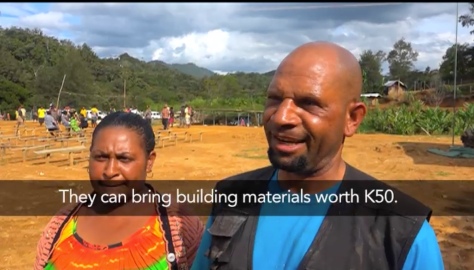
By Scott Waide - Posted on Inspirational Papua New Guineans.
In 2015, when Thomas Kopari and his wife Martina started the Ipau technical vocational education and training (TVET) school outside of Tari town, they didn’t expect the school to grow as rapidly as it did.
It all started from their passion for education. Thomas was the former Catholic Education Secretary and Martina, has managed the school since it began. They didn’t have any outside funding to began with. They used their own savings to pay for building materials, stationary and every other cost the school incurred.
“I can’t tell you how much we spent,” Martina says. “I’ve forgotten.”
Initially they wanted to train school leavers and offer an alternative technical pathway. But they were confronted with a huge demand for education and technical training. Nearly everyone – young and old, men and women, wanted to learn. So they took in as many as they could, charged them a small fee of K50 and began classes.
“The K50 we charge is for administration costs,” Thomas says. “We tell them that if they can’t pay in cash, they can pay in kind. If they don’t have money, they can bring a small pig or building materials wroth K50 or K100. The people were very happy with that arrangement.”
The opportunity for an education encouraged older men and women to enroll at what is now called Ipau TVET School.
“We couldn’t restrict people because of age. We found that while many of the older students didn’t have formal qualifications, they had years of experience and that has been beneficial for younger students,” Thomas said.
The classrooms are made from a mix of traditional building materials, iron sheeting and cement. In one of the classrooms, electrician and instructor, John Feku teaches a small class of students who are training to be electricians.
Apart from a blackboard and desks made out of packing cases, there is little else. They try as much as possible to find the equipment that will give them the much needed technical experience. It’s a difficult job, but there is no way, these people are giving up.
“This year, we are teaching them the basics of residential wiring and semi commercial wiring,” Feku says. “ After the first year, we sent them off to technical colleges in Mt. Hagen, Simbu and other parts of the country. This is the pathway for them.”
Up on the hill, several other classes are in session. In the motor mechanic class, there are a few older students in their 50s and 60s and a woman. Ipau TVET School also breaking barriers and challenging cultural mindsets that tend to segregate women and isolate the old. It is also uniting the communities.
“In the Hela culture, men don’t sit with the women. But when they come here, I tell them, sit at the same desk and they are finding that they are sharing an experience together. It’s changing mindsets in a small way.
“Many of the people who come here are traditional enemies. I tell them, to leave their weapons at the gate when they come to learn. This school is slowly changing the way people behave,” Thomas says.
Thomas and Martina soon found that they also needed to start an elementary school, so that smaller children could learn close to where their parents were getting educated.
Ipau Vocational School has become a community learning center in the truest sense.
The parents learn technical skills, their kids go to an elementary school on the same campus and the people contribute to the maintenance and construction of the school.
“When the parents come to school, there’s nobody to take care of their kids. So they bring their kids who school and the kids attend the elementary school.”
Many of the women come to learn tourism and hospitality. Martina doubles as the center’s manager and the tourism and hospitality instructor. She never thought it would come this far.
Many of the younger students expect to go on to other institutions. Many of the older students say small communities don’t need university degrees at this stage, but technical skills are highly valued in their villages.
